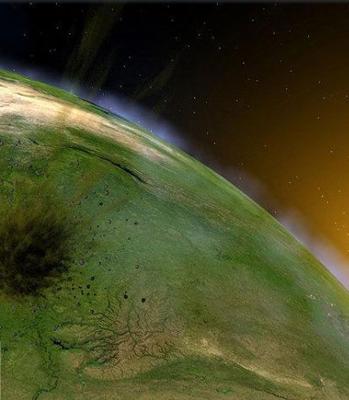Global Warming. What is it, really?
by Lahela
(Wisconsin, USA)
"Global warming." The very words bring up pictures of stranded polar bears, flooding, hurricanes, drought and disease. But what is it, really? Are we really looking at global warming, or merely climate change?
The world has accepted that Carbon Dioxide, or CO2 is a "greenhouse gas." But what is not very well explained is what a "greenhouse gas" is, or how it could cause global warming.Greenhouse Gases
Simply put, a greenhouse gas is a gas that retains heat. The way that the global warming hounds say it, you would think that it means that CO2 CREATES more heat. But the only way that would happen is if chemical reactions are being caused to release the energy it already has. This does happen, turning the CO2 into two seperate molecules (namely Carbon and Oxygen). This happens in plants all the time. But again, this is energy that is already stored in the molecules.
Carbon Dioxide is not the most potent greenhouse gas we have. In fact, the greatest greenhouse gas is water vapor. CO2 only absorbs energy in three small parts of the spectrum, where water vapor absorbs energy in nearly all parts. This means that more water in the air, the more energy retained in our atmosphere, the warmer it stays. Did you ever notice that the temperature drops when it rains?
Chicken little
Also, most of our global warming doom-sayers have been ignoring our most important source of global warming. It's the same source that keeps the atmosphere above freezing. Any six-year-old could tell you what it is. The biggest source of global warming is our personal star, the Sun. In all talks for global warming, the Sun is very rarely mentioned, and if anyone brings it up, they get ignored. After all, our sun is constant, isn't it? It's what is in our atmosphere that matters. Well, no. Those who watch the Sun are saying that even the Sun goes through cycles, and that it is about to get cooler. That means that it will be sending out less energy. That means that less energy will be coming to our Earth to warm it up.
I'm not saying Global Warming will not happen. After all, the sun-watching scientists could be wrong. Or the chemists who claim that water contains much more energy than CO2. I've even heard it claimed that we SHOULD already be in another Ice Age, and that greenhouse gasses is all that's keeping it at bay. Who really knows? What we should be doing is looking at ALL the facts, not just selected bits and proclaiming the sky is falling. By doing that, hopefully, we'll do the right thing.
Barry's Response - Thanks Lahela. We know climate change and global warming is a complex system. More than humankind can fully understand. If we see it turn around and become cooler, it will no longer be such a hot issue, so to speak.
Global Warming. What is it, really? I was never really sure if GW is really a bad thing to begin with.
Climate change has sparked a lot of debate, often with alarming predictions. Both natural and anthropogenic factors affect Earth's climate.
Variations in the climate
Throughout Earth's history, natural phenomena have impacted the climate. Volcanic eruptions, Earth's orbit, and solar radiation all affect global temperatures. Climate patterns are influenced by the Sun, our primary energy source. Despite these natural factors historically impacting climate, current scientific consensus emphasizes that recent rapid warming cannot be solely attributed to them.
Earth's climate is driven by the Sun's energy. Changes in solar radiation can affect the climate. The recent global warming trend is too rapid and consistent to be caused by changes in Earth's orbit and too significant to be caused by solar activity.
GHGs like carbon dioxide (CO2) and water vapor trap heat in Earth's atmosphere, causing the greenhouse effect. Even though water vapor is a potent GHG, its concentration in the atmosphere isn't a always direct cause of climate change (according to some research), but more likely a response to it. Although CO2 is present in smaller amounts, it regulates Earth's temperature. The greenhouse effect is exacerbated by human activities.
Human Activities
Despite natural factors influencing climate, humans are mainly to blame for recent rapid warming. The burning of fossil fuels, deforestation, and industrial processes have increased GHG concentrations in the atmosphere.
A conducive environment is essential to freedom of thought and scientific inquiry. The key to scientific progress is challenging prevailing theories. Nevertheless, such challenges should be backed by rigorous analysis and empirical evidence. There's a difference between healthy scientific debate and dismissing well-substantiated scientific findings.
Compassion is needed for those affected by climate change, especially vulnerable communities. Collaboration and considering multiple viewpoints can lead to better solutions.
Although natural factors have historically influenced Earth's climate, humans are largely responsible for the current rapid changes. Anthropogenic and natural factors interact. Sustainable solutions require scientific inquiry, open discussions, and compassion.
Feel free to comment below or Search this site for more information now.
Comments for Global Warming. What is it, really?
|
||
|
||
Do you have concerns about air pollution in your area??
Perhaps modelling air pollution will provide the answers to your question.
That is what I do on a full-time basis. Find out if it is necessary for your project.
Have your Say...
on the StuffintheAir facebook page
Other topics listed in these guides:
The Stuff-in-the-Air Site Map
And,
Thank you to my research and writing assistants, ChatGPT and WordTune, as well as Wombo and others for the images.
OpenAI's large-scale language generation model (and others provided by Google and Meta), helped generate this text. As soon as draft language is generated, the author reviews, edits, and revises it to their own liking and is responsible for the content.



